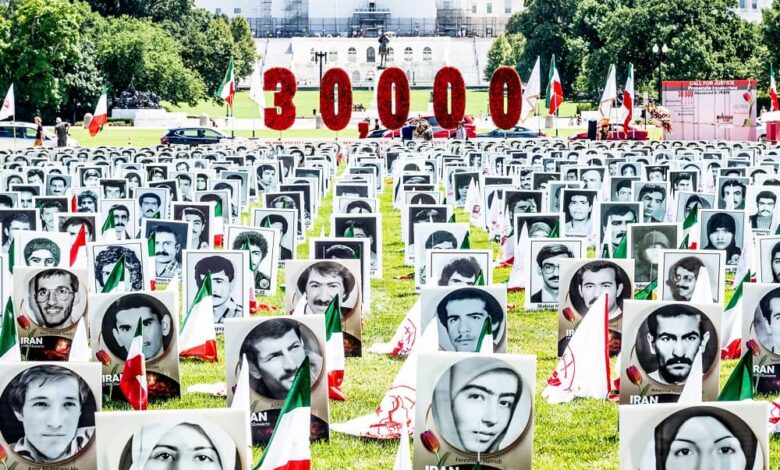Hamid Noury’s Verdict Sparks Jubilation among Iranians Despite Western Yielding to Regime’s Hostage Strategies

Photo exhibition, Washington D.C.
Three minutes read
Written by
Mehdi Oghbai
The recent verdict in the trial of Hamid Noury, a former Iranian prison official implicated in the 1988 massacre of political prisoners, represents a pivotal moment in the quest for justice. On December 19, the Svea Court of Appeal stated that Noury, identified as an assistant to the deputy prosecutor at the prison, was found to have participated in executions in collaboration with others. The court characterized this involvement as a “serious crime against international law.”
Unsurprisingly, the Iranian regime swiftly condemned the verdict as a politically motivated witch hunt. In a calculated move, Tehran orchestrated a trial of Swedish citizen Johan Floderus within 24 hours at Branch 26 of the Islamic Revolution Court, aiming to showcase its leverage in hostage negotiations. Regrettably, Western media played into this narrative, providing the regime with the coverage it sought.
Despite the historical precedent of the Iranian regime often securing the release of convicted or suspected terrorists, the Iranian people and human rights organizations celebrated the Swedish Court’s decision for reasons transcending Hamid Noury’s individual case.
The Noury trial establishes a crucial legal precedent, demonstrating that with political will, ample evidence, and robust legal mechanisms, impunity for crimes against humanity can be eradicated. The acknowledgment of the systematic nature of the 1988 massacre and Noury’s direct involvement in the executions lays the groundwork for future legal actions against other Iranian officials implicated in similar atrocities. This landmark ruling reaffirms the principle that no one, regardless of their position of authority, is immune from accountability.
The trial underscores the importance of universal jurisdiction, enabling the prosecution of crimes against humanity in any country, irrespective of when or where they occurred. This principle gains significance given the regime’s persistent refusal to hold its officials accountable, perpetuating a culture of complicity equating to loyalty.
The #Iran ian Resistance’s great commitment is to turn d blood of 1988 martyrs in2 a force 4 freedom &victory in Iran pic.twitter.com/EgrlOTB9za
— Maryam Rajavi (@Maryam_Rajavi) August 12, 2015
The fact that an Iranian official was tried and convicted in a Swedish court sends a powerful message that the global community will not tolerate impunity for such heinous crimes. This paradigm shift challenges the traditional notion of diplomatic immunity and underscores the shared responsibility of nations to address and rectify egregious human rights violations.
Since Mrs. Maryam Rajavi initiated the national and international campaign for justice for the victims of the 1988 massacre in 2016, a considerable journey has unfolded. This movement influenced the clerical regime’s presidential elections in 2017, leading to an embarrassing defeat for Ebrahim Raisi despite the Supreme Leader’s covert support.
The regime, motivated to suppress this movement, devised a sophisticated plan domestically and internationally, with Hamid Noury’s alleged luring into Sweden being a strategic component. Despite Tehran’s efforts to block the Iranian Resistance from entering the case, the regime’s plots unraveled during 113 court proceedings that spanned over two years.
Documentary: 1988 massacre of 30,000 political prisoners in Iran and the role of Ebrahim Raisi
Ultimately, in light of compelling testimonies from survivors associated with the Iranian Resistance, an abundance of evidence presented, and the dedicated efforts of their legal representatives, the regime’s machinations did not unfold according to its intended script. Consequently, Hamid Noury’s verdict is a landmark victory against the regime’s strategy to challenge the truth and its rightful advocates.
In defiance of Western appeasement policies and capitulation to Tehran’s hostage-taking tactics, the Noury case serves not as an endpoint but as a catalyst for further legal action. Survivors and human rights groups in other countries are encouraged to follow the Swedish legislative lead and initiate their investigations and prosecutions. The international community must seize this opportunity to ensure justice for the victims of the 1988 massacre and establish a precedent for holding perpetrators of similar atrocities worldwide accountable.
High time 2 send #Iran rgm human rights violations file, ie: massacre of 30,000 political prisoners in 1988, to UN Sec Council #iranelection
— Maryam Rajavi (@Maryam_Rajavi) December 19, 2009
As human rights violations under authoritarian regimes have hitherto served as mere political pressure points, the legal precedent set, coupled with the application of universal jurisdiction, signals a new era in the pursuit of accountability for senior officials involved in egregious human rights violations.

